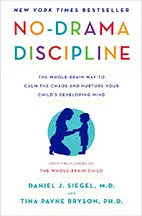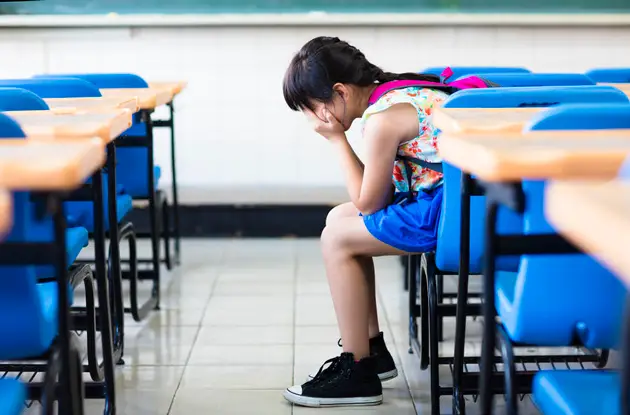When it comes to disciplining your children, even the most well-informed, best-intentioned parents use less-than-effective habits. Daniel J. Seigel, M.D., and Tina Payne Bryson, Ph.D., share the 20 discipline mistakes even great parents make.
Because we’re always parenting our children, it takes real effort to look at our discipline strategies objectively. Good intentions can be replaced by less-than-effective habits quickly, and that can leave us operating blindly, disciplining in ways that might not bring out our best—or the best in our children. Here are some common discipline mistakes made by even the best-intentioned, most well-informed parents. These mistakes crop up when we lose sight of our No-Drama, Whole-Brain goals. Keeping them in mind can help us to avoid them or to step back when we start heading down the low road.
1. Our discipline becomes consequence-based instead of teaching-based.
The goal of discipline is not to make sure that each infraction is immediately met with a consequence. The real goal is to teach our children how to live well in the world. But many times we discipline on autopilot, and we focus so much on the consequences that those become the end goal, the entire focus. So when you discipline, ask yourself what your real objective is. Then find a creative way to teach that lesson. You can probably find a better way to teach it without even using consequences at all.
2. We think that if we’re disciplining, we can’t be warm and nurturing.
It really is possible to be calm, loving, and nurturing while disciplining your child. In fact, it’s important to combine clear and consistent boundaries with loving empathy. Don’t underestimate how powerful a kind tone of voice can be as you have a conversation with your child about the behavior you want to change. Ultimately, you’re trying to remain strong and consistent in your discipline while still interacting with your child in a way that communicates warmth, love, respect, and compassion. These two aspects of parenting can and should co-exist.
3. We confuse consistency with rigidity.
Consistency means working from a reliable and coherent philosophy so that our kids know what we expect of them. It doesn’t mean maintaining an unswerving devotion to some sort of arbitrary set of rules. So at times you might make exceptions to the rules, turn a blind eye to some sort of minor infraction, or cut your child some slack.
4. We talk too much.
When kids are reactive and having a hard time listening, we often need to just be quiet. When we talk and talk at our upset children, it’s usually counterproductive. We’re just giving them a lot of sensory input that can further dysregulate them. Instead, use more nonverbal communication. Hold them. Rub their shoulders. Smile or offer empathic facial expressions. Nod. Then, when they begin to calm down and are ready to listen, you can redirect by bringing in the words and addressing the issue on a more verbal, logical level.
5. We focus too much on the behavior and not enough on the why behind the behavior.
Any good doctor knows that a symptom is only a sign that something else needs to be addressed. Children’s misbehavior is usually a symptom of something else. It will keep occurring if we don’t connect with our kids’ feelings and their subjective experiences that lead to the behavior. The next time your child acts out, put on your Sherlock Holmes hat and look through the behavior to see what feelings—curiosity, anger, frustration, exhaustion, hunger, and so on—might be causing the behavior.
6. We forget to focus on how we say what we say.
What we say to our kids matters. Of course it does. But just as important is how we say it. Although it’s not easy, we want to aim for being kind and respectful every time we communicate with our kids. We won’t always be able to hit this mark, but that should be our goal.
7. We communicate that our kids shouldn’t experience big or negative feelings.
When your child reacts intensely when something doesn’t go his way, do you ever shut down that reaction? We don’t mean to, but parents can often send the message that we’re interested in being with our kids only if they’re happy, and not when they’re expressing negative emotions. We may say things like, “When you’re ready to be nice, then you can rejoin the family.” Instead, we want to communicate that we will be there for them, even at their absolute worst. Even as we say no to certain behaviors or to how certain feelings get expressed, we want to say yes to our kids’ emotions.
8. We overreact, so our kids focus on our overreaction, not their own actions.
When we overshoot the mark with our discipline—if we’re punitive, or we’re too harsh, or we react too intensely—our children stop focusing on their own behavior and focus instead on how mean or unfair they feel we are. So do whatever you can to avoid building mountains out of molehills. Address the misbehavior and remove your child from the situation if you need to, then give yourself time to calm down before saying much, so you can be calm and thoughtful when you respond. Then you can keep the focus on your child’s actions rather than your own.
9. We don’t repair.
There’s no way we can avoid experiencing conflict with our kids. And there’s no way we’ll always be on top of our game in how we handle ourselves. We’ll be immature, reactive, and unkind at times. What’s most important is that we address our own misbehavior and repair the breach in the relationship as soon as possible, most likely by offering and asking for forgiveness. By repairing as soon as we can in a sincere and loving manner, we model for our children a crucial skill that will allow them to enjoy much more meaningful relationships as they grow up.
10. We lay down the law in an emotional, reactive moment, then realize we’ve overreacted.
Sometimes our pronouncements can be a bit “supersized”: “You can’t go swimming for the rest of the summer!” In these moments, give yourself permission to rectify the situation. Obviously, follow-through is important or you’ll lose credibility. But you can be consistent and still get out of the bind. For example, you can offer the “one more chance” card by saying, “I didn’t like what you did, but I’m going to give you another try at handling things the right way.” You can also admit that you overreacted: “I got mad earlier, and I wasn’t thinking things through very well. I’ve thought about it again and I’ve changed my mind.”
11. We forget that our children may sometimes need our help making good choices or calming themselves down.
When our kids begin to get out of control, the temptation is to demand that they “stop that right now.” But sometimes, especially in the case of small children, they actually may not even be capable of immediately calming themselves down. That means you may need to move in and help them make good choices. The first step is to connect with your child—with both words and nonverbal communication—to help him understand that you’re aware of his frustration. Only after this connection will he be prepared for you to redirect him toward making better choices. Remember, we often need to wait before responding to misbehavior. When our kids are out of control, that’s not the best time to rigidly enforce a rule. When they are calmer and more receptive, they’ll be better able to learn the lesson anyway.
12. We consider an audience when disciplining.
Most of us worry too much about what other people think, especially when it comes to how we parent our kids. But it’s not fair to your children to discipline differently when someone else is watching. In front of in-laws, for example, the temptation might be to be harsher or more reactive because you feel that you’re being judged as a parent. So remove that temptation. Pull your child aside and quietly talk to just him, without anyone else listening. Not only will this keep you from worrying how you sound to the others in the room, it will also help you get better focus from him, and you can better attune to his behavior and needs.
13. We get trapped in power struggles.
When our kids feel backed into a corner, they instinctually fight back or totally shut down. So avoid the trap. Consider giving your child an out: “Would you like to get a drink first, and then we’ll pick up the toys?” Or negotiate: “Let’s see if we can figure out a way for both of us to get what we need.” (Obviously, there are some non-negotiables, but negotiation isn’t a sign of weakness; it’s a sign of respect for your child and her desires.) You can even ask your child for help: “Do you have any suggestions?” You might be shocked to find out how much your child is willing to bend in order to bring about a peaceful resolution to the standoff.
14. We discipline in response to our habits and feelings instead of responding to our individual child in a particular moment.
We sometimes lash out at our child because we’re tired, or because that’s what our parents did, or because we’re fed up with his brother, who’s been acting up all morning. It’s not fair, but it’s understandable. What’s called for is to reflect on our behavior, to really be in the moment with our children, and to respond only to what’s taking place in that instant. This is one of the most difficult tasks of parenting, but the more we can do it, the better we can respond to our kids in loving ways.
15. We embarrass our kids by correcting them in front of others.
When you have to discipline your child in public, consider her feelings. (Imagine how you’d feel if your significant other called you out on something in front of other people!) If possible, step out of the room, or just pull her close and whisper. This isn’t always possible, but when you can, show your child the respect of not adding humiliation to whatever else you need to do to address the misbehavior. After all, embarrassment will just take her focus off the lesson you want to teach, and she’s unlikely to hear anything you want to tell her.
16. We assume the worst before letting our kids explain.
Sometimes a situation looks bad and it really is. But sometimes things aren’t as bad as they seem. Before lowering the boom, listen to your child. She may have a good explanation. It’s really frustrating to believe you have a rationale for your actions, yet to have the other person say, “I don’t care. I don’t want to hear it. There’s no reason or excuse.” Obviously, you can’t be naive, and any parent needs to wear her critical-thinking cap at all times. But before condemning a child for what seems obvious at first blush, find out what she has to say. Then you can decide how best to respond.
17. We dismiss our kids’ experience.
When a child reacts strongly to a situation, especially when the reaction seems unwarranted and even ridiculous, the temptation is to say something like, “You’re just tired,” “Stop fussing,” “It’s not that big a deal,” or “Why are you crying about this?” But statements like these minimize the child’s experience. Imagine someone saying one of these phrases to you if you were upset! It’s much more emotionally responsive and effective to listen, empathize, and really understand your child’s experience before you respond. Even if it seems ridiculous to you, don’t forget that it’s very real to your child, so you don’t want to dismiss something that’s important to him.
18. We expect too much.
Most parents would say that they know that children aren’t perfect, but most parents also expect their children to behave well all the time. Further, parents often expect too much of their children when it comes to handling emotions and making good choices—much more than is developmentally appropriate. This is especially the case with a firstborn child. The other mistake we make in expecting too much is that we assume that just because our child can handle things well sometimes, she can handle things well all the time. But especially when kids are young, their capacity to make good decisions really fluctuates. Just because they can handle things well at one time doesn’t mean they can at other times.
19. We let “experts” trump our own instincts.
By “experts,” we mean authors and other gurus, as well as friends and family members. It’s important that we avoid disciplining our kids based on what someone else thinks we ought to do. Fill your discipline toolbox with information from lots of experts (and non- experts), then listen to your own instincts as you pick and choose different aspects of different approaches that seem to apply best to your situation with your family and your unique child.
20. We’re too hard on ourselves.
We’ve found that it’s often the most caring and conscientious parents who are too hard on themselves. They want to discipline well every time their kids mess up. But it’s just not possible. So give yourself a break. Love your kids, set clear boundaries, discipline with love, and make up with them when you mess up. That kind of discipline is good for everyone involved
From the book NO-DRAMA DISCIPLINE by Daniel J. Siegel, M.D., and Tina Payne Bryson, Ph.D. Reprinted by arrangement with Bantam, an imprint of Random House, a division of Random House LLC. Copyright © 2014 by Mind Your Brain, Inc., and Bryson Creative Productions, Inc. This material has previously appeared in a different form on mom.me.





















